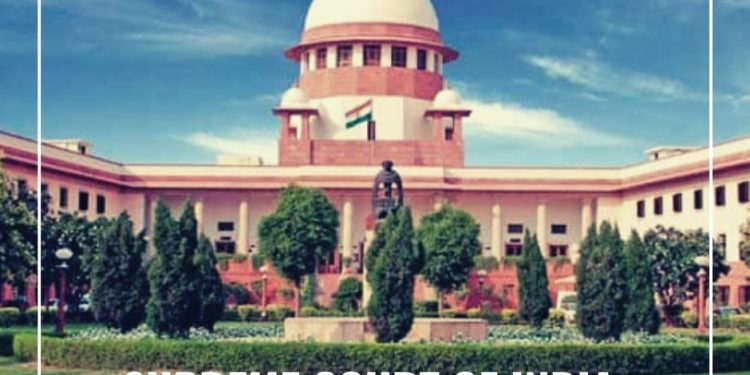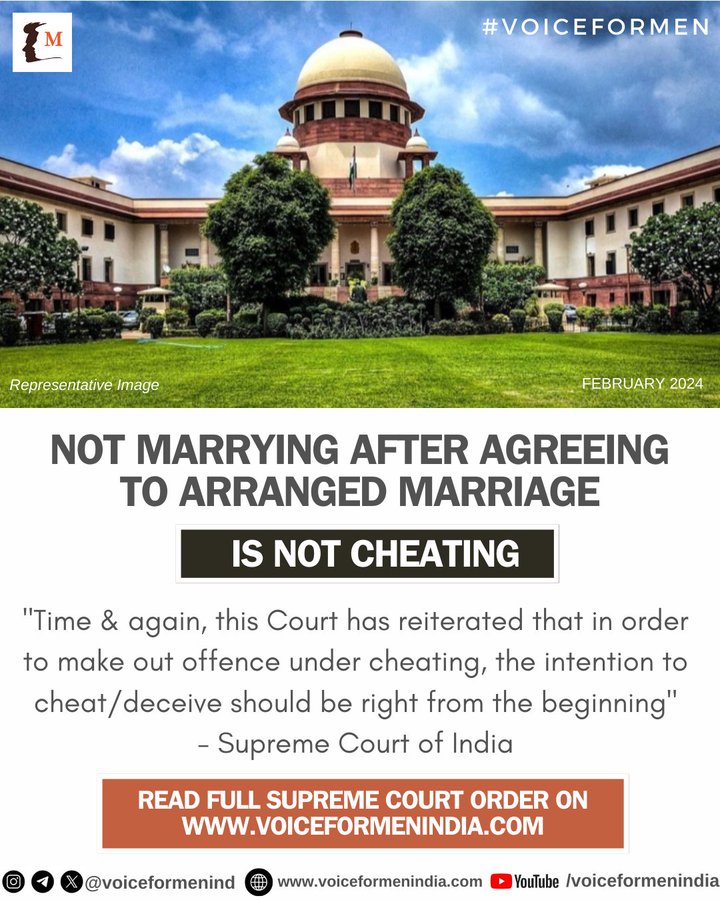The Supreme Court in its order dated February 4, 2024 has made it absolutely clear that a “marriage proposal” not culminating into actual marriage – despite family talks and meetings – cannot be termed as cheating.
The apex court was hearing a case filed by a woman against a man who refused to marry her after both side families had agreed.
READ ORDER | Married Woman Cannot Charge Male Partner Of Rape On Promise Of Marriage After Consensual Sex: Kerala High Court
Case:
The complainant woman Ms S is an M.Tech. graduate and works as a lecturer. Her family was on a lookout for a suitable alliance for her marriage and they agreed to get her hitched with one Mr R.
After the families met, S & R started chatting over the phone. According to S, her family had also booked a marriage hall by paying Rs 75,000 in advance.
This marriage never took place and soon S learnt through newspapers that R had got married to someone else.
Subsequently, S lodged an FIR against R and his five other family members (mother, brothers & sisters) under Sections 406/420/417 read with Section 34 of IPC. The FIR, primarily related to offence of cheating and criminal breach of trust.
A Rape Case Is Not A Mode Of Forcing A Man To Fulfil His Promise Of Marriage: Ahmedabad Sessions Court
Karnataka High Court
In 2021, the Karnataka High Court held R guilty of cheating under Section 417 IPC, which entails a jail term of up to one year or fine, or both.
This order was challenged by the accused.
Supreme Court of India
The Supreme Court bench comprising of Justice Sudhanshu Dhulia and Justice Prasanna Bhalachandra Varale dismissed the case against the accused man noting that there can be multiple reasons behind initiating a marriage proposal and eventually not ending up in a marriage.
The bench analysed how exactly cheating is defined:
415. Cheating.—Whoever, by deceiving any person, fraudulently or dishonestly induces the person so deceived to deliver any property to any person, or to consent that any person shall retain any property, or intentionally induces the person so deceived to do or omit to do anything which he would not do or omit if he were not so deceived, and which act or omission causes or is likely to cause damage or harm to that person in body, mind, reputation or property, is said to “cheat”.
To this, the Supreme Court remarked:
A perusal of the aforesaid provision shows that the offence of cheating is in two parts. The first is where a person fraudulently or dishonestly deceives another in inducing that person to deliver any property to any person etc.
The second part of the offence would be made out if somebody is deceived to do an act which causes damage or harm to that person “in body, mind, or reputation or property is said to have cheated.
READ ORDER | Mere Refusal To Marry After Sexual Relations Not Cheating; Bombay HC Acquits Man After 22-Years
Dismissing the case against the accused, the Supreme Court concluded:
Time and again, this Court has reiterated that in order to make out an offence under cheating the intention to cheat or deceive should be right from the beginning.
By no stretch of imagination, this is even reflected from the complaint made by the informant.
Interview | Rape Law On Ground Of False Promise Of Marriage Is Highly Archaic: Hemant Batra (Public Policy Advocate)
Voice For Men India Opinion:
- Communication is the key to all such problems
- Families meeting to discuss an arranged alliance, may not mandate them to go ahead with the marriage (applicable to both sides)
- Marriage is a lifelong union not just between a couple, but most often also the families
- Thus, if there are any doubts from his or her side, it must be the absolute choice of an individual to not proceed with such alliance
- However, both parties must be vocal enough and clearly communicate a yes or a no to the other side so that there is no element of cheating involved
- The man in this case could have been more clear in his refusal for marriage, so that the woman’s family did not live under any hopes
- If the man backed out from marriage after booking of the wedding venue with his consent, he should have been gentleman enough to bear the costs equally
- On the other hand, women too, whether in love or arranged marriage, should be ready for rejection
- A rejection or a NO, should not result into a cheating, or a rape on promise of marriage FIR
- Until both men and women mature as responsible adults, it is better they stay away from marriage
MUST WATCH:
Why Background Check Of Would-Be Wife Is Important | Voice For Men India
LEAVE YOUR COMMENTS BELOW:
READ ORDER | Not Marrying After Agreeing To Arranged Marriage Is Not Cheating: Supreme Court
— Voice For Men India (@voiceformenind) March 8, 2024
▪️SC: "Time & again, this Court has reiterated that in order to make out offence under cheating intention to cheat/deceive should be right from the beginning"https://t.co/jOiGvBpcrH
Join our Facebook Group or follow us on social media by clicking on the icons below
If you find value in our work, you may choose to donate to Voice For Men Foundation via Milaap OR via UPI: voiceformenindia@hdfcbank (80G tax exemption applicable)
































